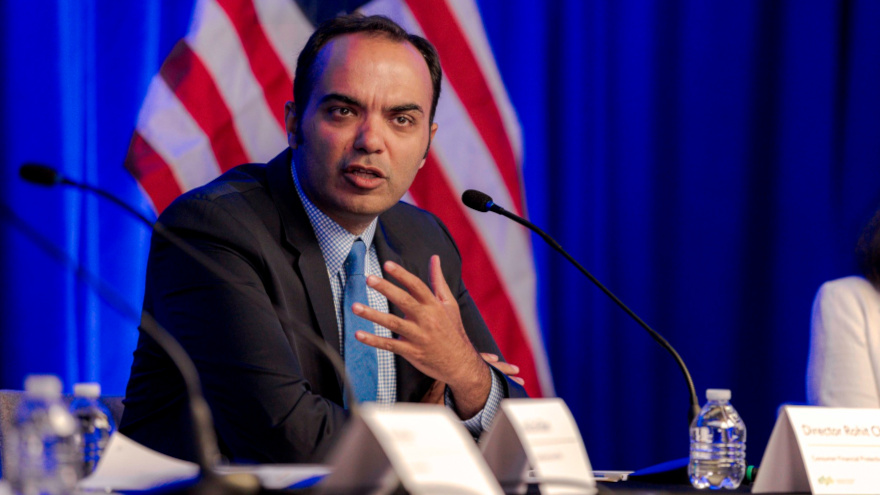CFPB’s newest Supervisory Highlights detail numerous ‘illegal practices’ in auto finance

Former Consumer Financial Protection Bureau director Rohit Chopra. Photo by Ledon Carroll / CFPB.
By subscribing, you agree to receive communications from Auto Remarketing and our partners in accordance with our Privacy Policy. We may share your information with select partners and sponsors who may contact you about their products and services. You may unsubscribe at any time.
The Consumer Financial Protection Bureau published a special edition of its Supervisory Highlights on Tuesday focused solely on auto finance.
The regulator found numerous “illegal practices,” including vehicle repossessions even when the customers caught up on monthly payments or received an extension.
The CFPB said it also found other “illegal conduct” associated with providing inaccurate disclosures, misapplying payments and putting incorrect information on consumers’ credit reports.
Officials also highlighted “significant problems” with add-on products that can increase the financing cost of financing as well as issues connected with refunds when the contract is terminated.
CFPB examiners said they found subprime auto finance companies charging consumers for optional add-on products that the consumers did not agree to purchase.
In other instances, examiners said they found that, following early termination of a contract, servicers failed to provide refunds or credits to consumers for the unused portion of the product.
Subscribe to Auto Remarketing to stay informed and stay ahead.
By subscribing, you agree to receive communications from Auto Remarketing and our partners in accordance with our Privacy Policy. We may share your information with select partners and sponsors who may contact you about their products and services. You may unsubscribe at any time.
The bureau noted that its examiners also found that servicers required contract holders to make two separate, in-person visits to a dealership to cancel an unwanted add-on product, which prevented consumers from exercising their cancellation rights.
CFPB said its examiners directed the auto finance companies to stop this “illegal conduct and make it clear to consumers that add-on products are optional.”
The companies also were directed to update and revise language in contracts with their service providers where applicable, according to the CFPB.
In the recovery department, the CFPB said its exams uncovered finance companies wrongfully repossessed vehicles due to service providers failing to cancel orders to repossess vehicles when consumers had made payments or had obtained a deferment, modification, or extensions that should have prevented repossessions.
CFPB examiners said they also found servicers repossessed vehicles without having a valid recorded lien to the vehicle.
“Some servicers were also misallocating borrowers’ auto loan payments, such as applying payments to late fees first instead of applying to the loan principal and interest, which resulted in borrowers having to pay erroneous late fees,” officials said.
“As a result, CFPB examiners directed servicers to fully refund all accounts that incurred late fees due to payments being applied in a different order than that disclosed on the servicers’ website,” they continued.
And on the origination side of the business, the bureau said they found finance companies “misleading” applicants about the chance to qualify for a low interest rate, “when in reality the lowest rate offered was more than double the advertised rate.”
Officials said finance companies “were directed to stop using misleading marketing materials designed to bait-and-switch consumers on interest rates.”
Finally, bureau examiners said they found finance companies were knowingly placing inaccurate contract information on “thousands” of consumers’ credit reports. These findings included incorrect amounts past due for charged-off accounts, inaccurate dates of when contract holders fell behind on payments and inaccurate actual payment amounts following a payoff or settlement.
“In some cases, lenders were relying on inappropriate computer systems that were not designed to report information about auto loans,” the CFPB said. “In response to the findings, lenders are conducting reviews and correcting the furnished information for all affected consumers.”
The CFPB pointed out that it has previously taken action against companies for “illegal practices” in auto finance. Those moves involved Toyota Motor Credit, which paid $60 million for withholding refunds and “tarnishing consumer credit reports, and Wells Fargo, which the bureau said illegally assessed fees and interest charges on auto financing and mortgages.
“Borrowing to buy a vehicle is one of the largest sources of household debt for American families, and many deal with unnecessary costs and challenges paying for their car,” CFPB director Rohit Chopra said in a news release. “The CFPB will take action against auto-finance companies that charge fees for nonexistent services or repossess cars after borrowers make payments.”
The complete Supervisory Highlights stemming from examinations related to auto finance completed between Nov. 1 and Aug. 30 can be found here.


